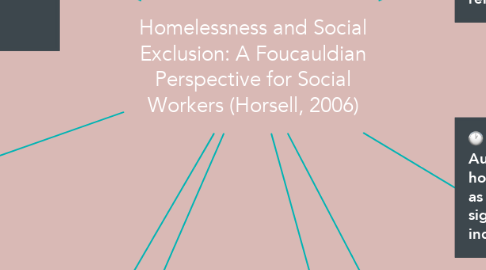Homelessness and Social Exclusion: A Foucauldian Perspective for Social Workers (Horsell, 2006)
by Diana Gabriela Hernandez Lozano

1. In this text have several aims, the first is to critically evaluate the more prominent uses of the concept of social exclusion as a tool of policy analysis and intervention within the context of the marketisation and residualisation of the welfare state
2. The concept of social exclusion has come to dominate discussions of social division, whereas the breadth and multitude of definitions of social exclusion indicate the importance of the concept both politically and socially.
2.1. Smyth and Jones (1999, p. 13) note the extent to which the term has been used to describe a broad range of social issues, including the marginalised position of women, disabled children, homeless people, ethnic minorities, young people and nomadic workers
3. Definitions of social exclusion play a significant role in the type of policy response developed. Every policy proposal has an explicit diagnosis. Policy from a social constructionist perspective can be seen as a process of argumentation wherein policy constitutes a representation of a political issue. In this context, social exclusion has been conceptualised as:
3.1. . Disadvantage related to social economic and political norms;
3.2. . The process through which disadvantage comes about; and
3.3. . The outcome of processes of marginalisation.
4. Social workers work within policy frameworks that provide the context for practice. As I have argued throughout the present paper, contemporary contexts revolve around issues of social integration along normative lines.
5. The article considers the malleability of the concept of social exclusion as a tool of policy analysis and intervention in relation to homelessness
6. Within Both European and Australian Contexts, homelessness has been profiled as on of, if not the, most significant forms through wich individuals are excluded socially
7. Discussions of homelessness tend to be shaped by a number of discourses concerning causation, definition, counting the homeless and appropriate responses (Robinson, 2003, p. 15). Underpinning these discourses, there has been. in recent times. a trend to discuss homelessness through the lense of social exclusion.
8. The social is a contextualised, negotiated space providing the possibilities for change. Taking on board Foucauldian ideas about power and resistance in the context of practice, social workers are in unique positions to counter hegemonic discourses by accumulating evidence that validates client knowledge and challenges official constructions of clients’ lives
8.1. This involves approaches that include homeless people as an integral part of society.
8.2. Social workers can easily become co-opted to engage in reproducing exclusionary discourses, but also occupy a unique position in facilitating and promoting alternatives.


